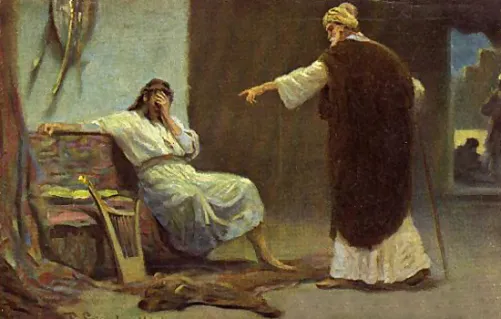Saturday, January 29, 2022 (today’s lectionary)
Nathan confronts David
THOU ART THE MAN!
And David knew it was true. He had buried his shame, but that would not do. He heard Nathan’s parable as if it were a case for David the Judge. But it was David being judged. And as that dawned on him, his forehead poured with sweat. He trembled with fear. His lyre lay untouched beside him, and the beauty of words he had sung in the wilderness only mocked him.
YOU ARE THE MAN!
David’s bare feet felt for the comfort of his rug, but there was no comfort. He wiped the tears of shame from his eyes, but more tears took their place. He could no longer be comfortable in his own skin. His guilt fell on him like dust and ashes, turned to graveyard mud. David wanted to die.
I have sinned against the Lord!
Nathan speaks God’s word about David’s future, in what Craig Keener calls “almost an outline for the rest of 2 Samuel.”
Because by doing this you have shown utter contempt for the Lord, the child born to you must surely die.
But Nathan also told David he was forgiven.
The Lord on his part has forgiven your sin: you shall not die.
David wanted to die, but he could not. God’s forgiveness mocked his own anguish. Or softened it. Or overrode it. God’s forgiveness mattered, and David’s self-loathing did not.
I read ahead in this Second-Samuel-Storybook from the Hebrew Bible. David’s children run into difficulties. Amnon falls in love with his sister Tamar, forces her to have sex, and Absalom eventually kills Tamar. Absalom runs from his father David. David seems paralyzed, unable to confront either Amnon or Absalom.
David’s general Joab can’t send Nathan, but he finds a wise woman who confronts David with yet another parable, this time about her own sons. Their lives (and deaths) reflect those of the sons of David. She speaks to him:
The king has not brought back his own banished son. Like water spilled upon the ground, which cannot be recovered, so we must die. But that is not what God desires; rather he desires ways so that a banished person does not remain banished from him!
Please, David! Forgive your son Absalom, as you have been forgiven. Remember the pleading of your own song:
Create in me a clean heart, O God.
Renew a right spirit within me.
Cast me not away from thy presence
And take not thy Holy Spirit from me.
And David does. Forgive him. Sort of. He brings Absalom out of exile, but he will not allow his son to see him. David’s half-heartedness results in Absalom sleeping with David’s concubines and then his death at the hands of David’s general Joab, And it ends with David blaming himself, again, as he had when Nathan spoke so strongly to him, so many years before.
The Lord struck the child that the wife of Uriah had borne to David, and it became desperately ill. David besought God for the child and fasted for seven days, lying in sackcloth on the ground. He refused to rise.
David’s mind is swimming with imaginations and guilty horror, as he prays for his son’s life:
I have sinned, my Lord, and I cannot escape the guilt of my sin. Your forgiveness does not extend to the life of my son, and I can do nothing except plead with you for his life. Please, O Lord, restore my son to the life you yourself gave him.
I love you, my son David. And I love your son too.
I deserve nothing except the lash, my Lord. Thorns on my head, a cross. Why take out your vengeance on my son? Can it not be me? Let me die, o please, let me die in place of my son.
I love you, my son David. And I love your son too.
Surely there is something I can do to appease your angel of death, my Lord. Can I sing a song? Can I play my harp and pacify your anger? Can I not worship as I have in the past, and know that surely your goodness and mercy follows me? All the days of my life? Oh, yes?
I love you, my son David. And I love your son too. All the days of his life.
On the seventh day David and Bathsheba’s first son died. David knew the power of God. He knew his own powerlessness. And he accepts his place.
David got up from the ground. He changed his clothes, he worshiped the Lord, he ate. “While the child was still alive, I fasted and wept. Who knows, I thought. The Lord may be gracious to me and let the child live.
But now that he is dead, why should I go on fasting? Can I bring him back again? I will go to him, but he will not return to me.
(Painting here)
(2 Samuel 12, Psalm 51, John 3, Mark 4)
(posted at www.davesandel.net)
#